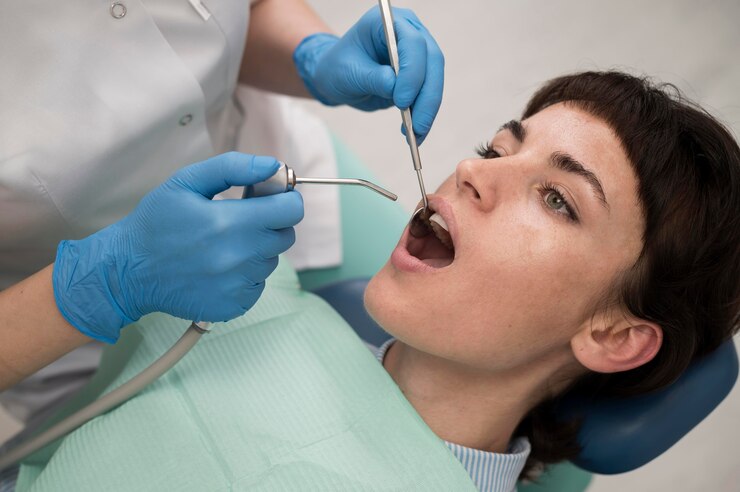Tooth extraction, though often necessary, doesn’t have to be a painful experience. At Carl F. Lipe DDS, PLLC, we understand the importance of gentle care when it comes to preserving your oral health. Our team is dedicated to making your tooth extraction procedure as comfortable and stress-free as possible.
Why Trust Us for Your Tooth Extraction in Denver?
Choose Carl F. Lipe, DDS, PLLC for your tooth extraction in denver because of our commitment to quality, state-of-the-art technology, and personalized dental care. We ensure you get the best treatment with effective results that speak for themselves We also offer Dental Bridges , Cosmetic Dentistry , Denture Solution , Dental implants , Full Mouth Reconstruction , Dental Crown and more. Do follow us on facebook & instagram for dental tips & advice.
- Expertise: Dr. Carl Lipe comes with years of experience and skill in every extraction.
- Compassionate Care: Our skilled team of professionals prioritizes your comfort and well-being throughout the extraction process.
- State-of-the-Art Facilities: We use advanced technology for precise and efficient extractions.
- Personalized Attention: Each patient receives a customized treatment plan that caters to their unique needs.
Clinic Tour Video
Types of Tooth Extraction
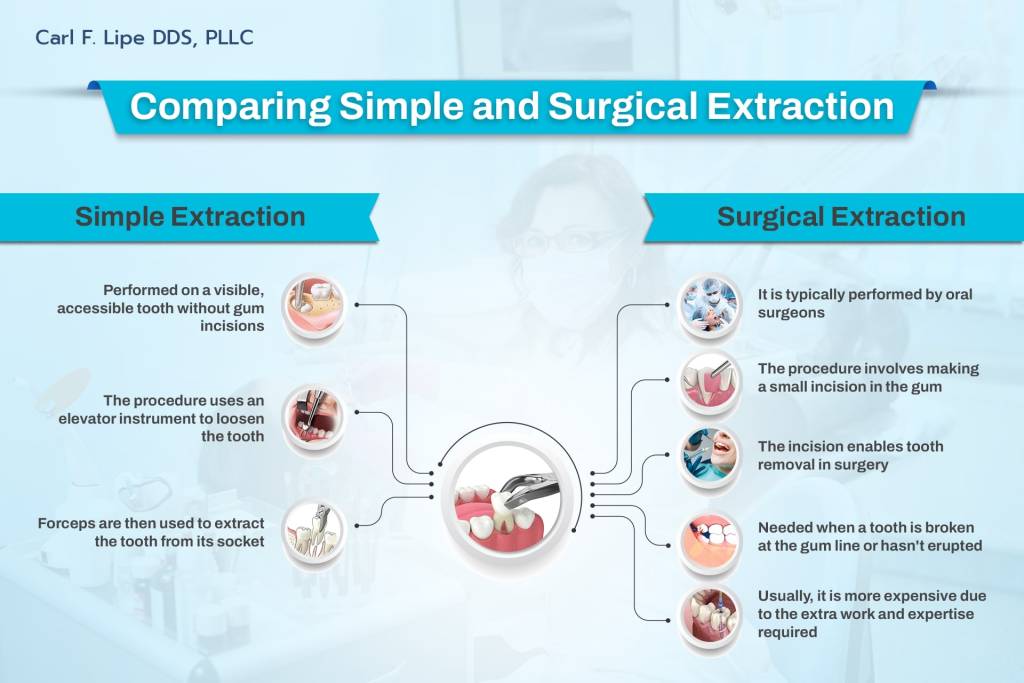
1. Simple Dental Extraction
In cases where the tooth is visible and easily accessible, a simple extraction may be performed. This involves loosening the tooth with specialized tools and gently removing it from the socket.
2. Surgical Dental Extraction
For more complex cases, such as impacted teeth or broken roots, a surgical extraction may be necessary. This procedure involves making a small incision in the gum to access the tooth.
When Are Tooth Extractions Necessary?
- Severe Tooth Decay: When decay has reached a point where restoration is not possible.
- Infection: To prevent the spread of infection to surrounding teeth and gums.
- Advanced Gum Disease: When gum disease has loosened the tooth from its socket.
- Severely Damaged Teeth: Due to trauma or fractures that compromise the tooth’s structure.
- Crowding: To create space for orthodontic treatment or due to overcrowding.
- Impacted Wisdom Teeth: When wisdom teeth are trapped beneath the gum line.
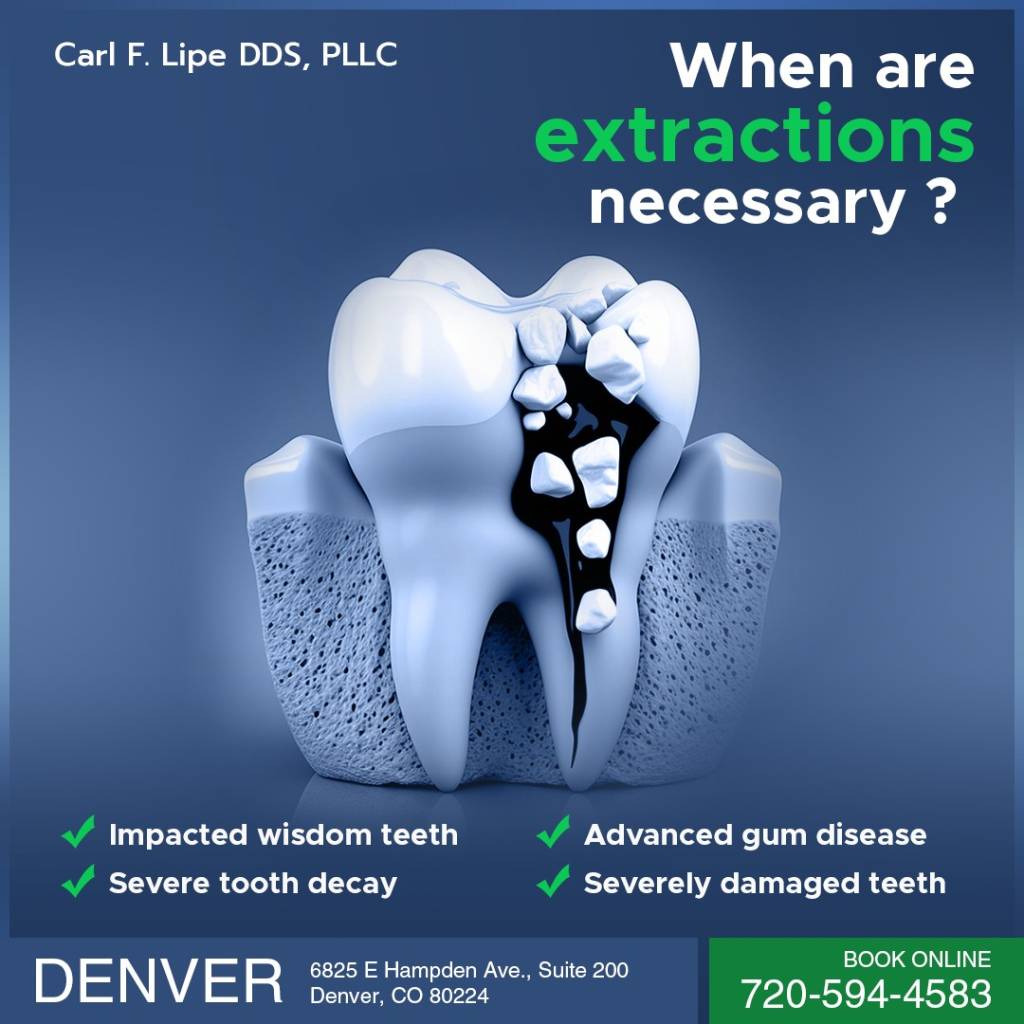
Signs You May Need a Dental Extraction
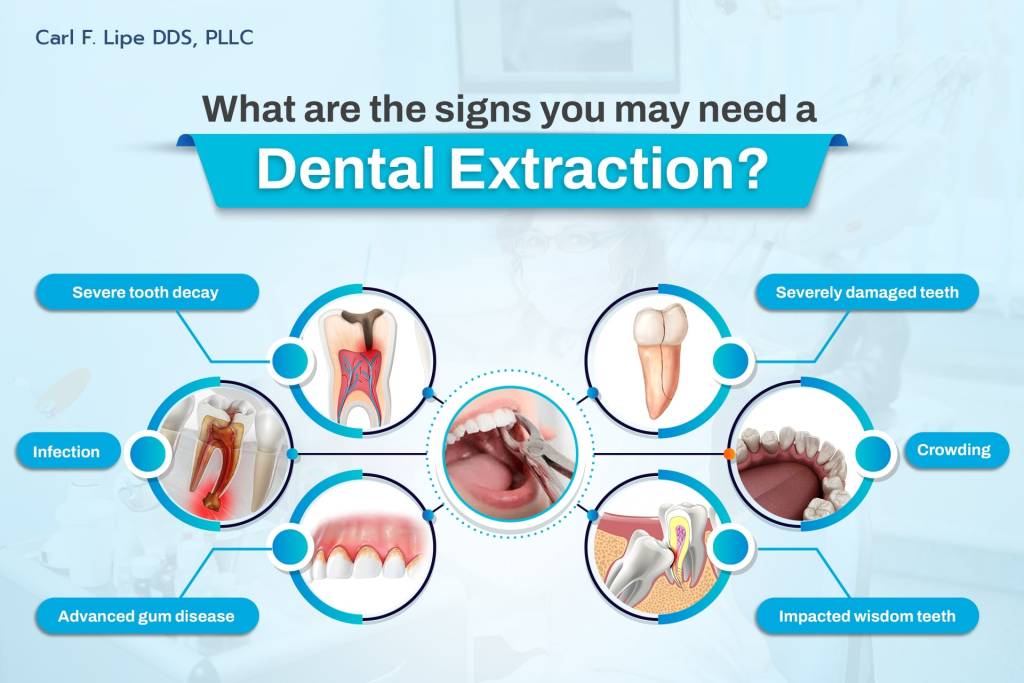
- Severe tooth pain: Persistent, intense pain in a tooth can indicate deep decay or infection, often requiring extraction to alleviate discomfort and prevent further issues.
- Sensitivity to hot and cold temperatures: If a tooth is susceptible to temperature changes, it might suggest nerve damage or severe decay that could necessitate removal.
- Fractured or broken teeth: Teeth that are severely cracked or broken may not be repairable and could need to be extracted to prevent infection or further damage.
- Loose teeth: Teeth that feel loose or are shifting in the mouth can be a sign of underlying issues like advanced gum disease, which might require extraction.
- Pain when chewing: Difficulty or pain while chewing can indicate structural problems or infections in the teeth or gums, potentially leading to the need for extraction.
- Recurring tooth infections: Frequent infections in a tooth, especially if they don’t respond well to treatment, may mean that extraction is the best option to prevent spread and recurrence.
- Visible overcrowding or misalignment: Teeth that are overcrowded or misaligned can cause various dental problems, and extracting one or more teeth may be necessary to create space and improve alignment.
- A tooth abscess (pus-filled sac near the tooth): An abscess indicates a severe infection that can damage surrounding tissue and bone, often requiring extraction to resolve the issue fully
Tooth Extraction Cost in Denver
| Tooth Extraction | USA | Australia |
| Simple | $75-$300 | $70 – $140 |
| Surgical | $150-$650 | $140 – $280 |
In the USA, the overall cost of tooth extraction varies with the complexity of the process. The cost of a simple tooth extraction usually ranges between $75 and $300 per tooth without insurance. The cost of surgical extractions can be significantly higher as they involve impacted or broken teeth. It ranges from $150 to $650 per tooth. Prices may vary depending on location, dentist, and insurance coverage.
Tooth Extraction Procedure: What Happens with Dr. Carl?
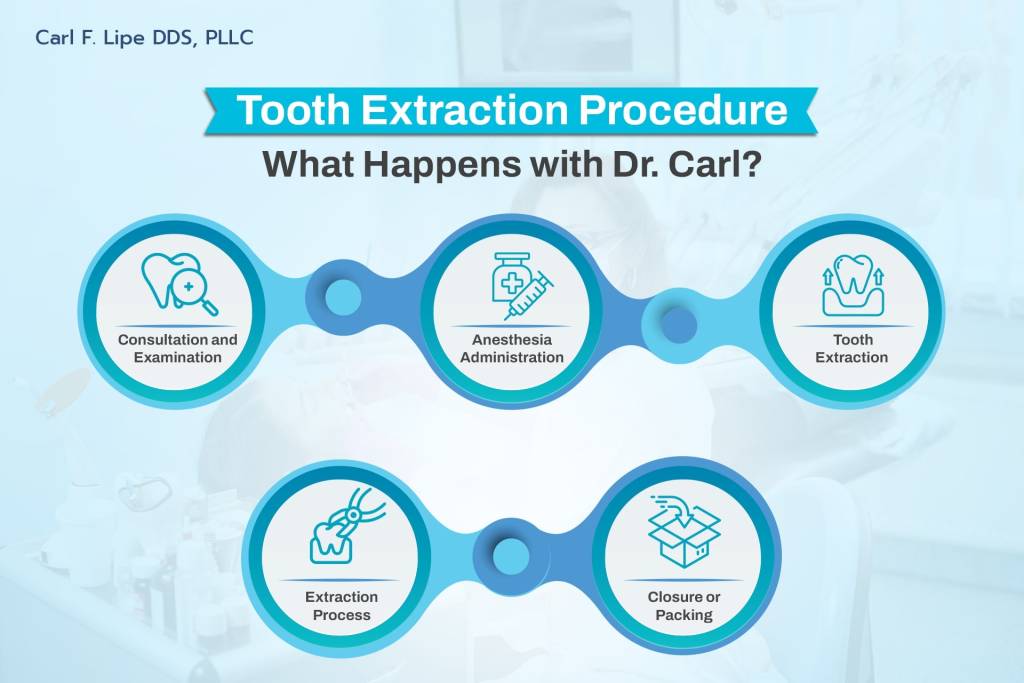
The idea of getting a tooth extracted may seem scary, but there are reasons we recommend your extraction. Tooth Extraction is a dental procedure where your tooth is removed from its socket. We at Carl F Lipe. make sure you feel maximum comfort and minimal pain.
1. Consultation and Examination
Dr. Carl will begin by discussing the procedure with you and addressing any concerns or questions you may have. A thorough examination of the tooth will then be conducted.
2. Anesthesia Administration
To ensure your comfort throughout the procedure, a local anesthetic will be administered to numb the area around the tooth.
3. Tooth Extraction
Using specialized instruments, Dr. Carl will gently loosen the tooth from its socket. For impacted or more complex cases, a small incision may be necessary.
4. Extraction Process
With precise care, the tooth will be safely removed. You may feel some pressure during this step, but it should not be painful.
5. Closure or Packing
Depending on the case, the socket may be left to heal on its own or filled with a dissolvable material to aid in healing.
How Long Does a Tooth Extraction Take?
The duration of the procedure is based on the factors of tooth location and the complexity of the extraction. The procedure typically takes about 30 to 60 minutes, however, if you have more complex cases, like impacted wisdom tooth extractions, that may require extra time.
What to Expect After Tooth Extraction
A tooth extraction generally takes 1 to 2 weeks to fully heal, although individual recovery times may vary. After your procedure, you can expect some swelling and mild discomfort. Our team will provide detailed instructions on post-extraction care to promote optimal healing.
Recovery and Eating Guidelines
During the initial phase of recovery, stick to soft foods to avoid discomfort. Opt for options such as soup, yogurt, and mashed potatoes. Eating nutritious food will help reduce the discomfort and heal the area. Avoid hard and spicy food that may irritate the extraction site.
Gradually reintroduce solid foods as you feel comfortable, ensuring that they do not disturb the extraction site. This will aid in a smooth and speedy recovery.
Don’t smoke or consume alcohol as it can risk the healing process. Follow these guidelines for a smoother and faster recovery.

FAQ
What to eat after tooth extraction?
Stick to soft and easily chewable food items like applesauce, yogurt, smoothies, soup, pudding, etc. for the first few days.
What happens after tooth extraction?
One may experience swelling, bleeding, and discomfort, which typically subsides within a few days.
Does tooth extraction hurt?
The procedure is usually done under local anesthesia, so you shouldn’t feel pain during extraction. Some discomfort is normal afterward.
How to stop bleeding after tooth extraction?
Bite down on a gauze pad for 30-45 minutes. If bleeding continues, use a new gauze pad and apply pressure.
How long does a tooth extraction take to heal?
The entire healing process usually takes one to two weeks.
How to reduce pain after tooth extraction?
Washing the mouth with saltwater, and applying ice packs are the usual tips after a dental extraction. Also, follow your dentist’s instructions for more.
Does wisdom tooth extraction hurt?
The procedure is usually done under local anesthesia, so you shouldn’t feel pain during extraction. Post-procedure discomfort can be managed with pain reliever
Can we smoke after tooth extraction?
No, the ideal time to avoid smoking should be at least 72 hours to prevent complications.
Why no dairy after tooth extraction?
Dairy products can sometimes interact with medications and cause nausea.
What happens if bleeding doesn’t stop after dental extraction?
Visit our clinic if bleeding persists beyond 24 hours.
How to fill gap after extraction?
Options include dental implants, bridges, or partial dentures.
Can I drink alcohol after the procedure ?
Avoid alcohol for at least 24 hours as it can interfere with healing.
Can I drink tea after tooth extraction?
Yes, but make sure it’s lukewarm to avoid irritating the extraction site.
Can I eat ice cream after tooth extraction?
Yes, but ensure it’s not too cold, and avoid flavors with small, hard pieces.
Is dental extraction necessary for braces?
Sometimes, extractions are required to create space for proper teeth alignment.
Can I brush after extraction?
Tooth extraction requires a minor surgical process and brushing can interrupt the healing. So, brush gently and avoid the extraction site for the first 24 hours.
How to sleep after wisdom tooth extraction?
Keep your head elevated with pillows to reduce swelling.
Can I eat spicy food after tooth extraction?
Avoid spicy foods until the extraction site has healed to prevent irritation.
Can I use an electric toothbrush after tooth extraction?
Wait a few days before using an electric toothbrush and be gentle around the extraction area.
How much is a tooth extraction?
The costs vary based on the type of teeth you want to extract, but typically it ranges from $150 to $350 for a simple extraction. Book a free consultation for a more accurate estimate.
Is surgical tooth extraction painful?
It’s done under anesthesia so that you won’t feel pain during the procedure. Some discomfort is expected afterward.
What are the side effects of wisdom tooth extraction?
Common side effects include swelling, bruising, and temporary numbness.
Can I use mouthwash after extraction?
Avoid mouthwash for the first 24 hours. Afterward, use a saltwater rinse instead.
What precautions should be taken after tooth extraction?
Avoid smoking, strenuous activities, using your tooth to open or bite something hard, and drinking through a straw. Follow your dentist’s instructions closely.
Are stitches required after extraction?
Sometimes, stitches are used to close the extraction site. Your dentist will inform you if they are needed.
Is antibiotic needed after dental extraction?
Antibiotics are prescribed in cases of infection or if you have certain medical conditions.
Is fever normal after the procedure?
A low-grade fever can occur but consult your dentist if it persists.
What are the signs of infection ?
Tooth infection signs include severe pain, swelling, pus, fever, and a bad taste in the mouth.
How much swelling is normal after wisdom tooth extraction?
Swelling peaks around 48-72 hours post-extraction and should gradually decrease.
